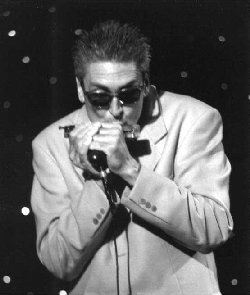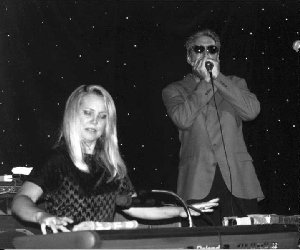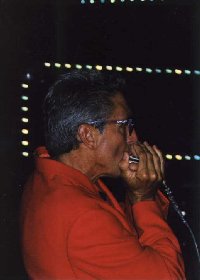


 Famous Dave's, 7/12/98 Photo © 1998 by Tom Asp. All rights reserved |
Rod: The last one was "Live At B.B. Kings" on Big Mo and that was 1993. So four years.
Ray: How did you get hooked up with Tone-Cool?
Rod: Well I was playing at the King Biscuit Festival and at that time I was almost making a deal with Capricorn. They were falling forward and backward deciding whether they were going to do blues. Finally they decided they wasn't going to so I started looking elsewhere and I had met Richard (from Tone-Cool) down there and he said don't count me out I'm a strong bidder. So he made a strong bid and we ended up going with them and I'm glad I did because he was a real straight shootin' cat.
Ray: When was the last time you played in Minnesota, it's been awhile hasn't it?
Rod: Yeah a guy was telling me tonight we haven't been here for three years, I though it was just last year. [Laughs] It was at the Cabooze.
Ray: Going back to the early days, the Dirty Blues Band, was that your first group?
Rod: Yes it was.
Ray: That was the late '60's, like '67 or so?
Rod: That's right. And we came out with two albums on ABC Bluesways. They had a lot of blues acts. They had T-Bone Walker, Joe Turner, Otis Spann, George Smith, and John Lee Hooker. And I guess they figured they could sell some blues to hippies, because we had long hair, you know. So they signed us up too. Made two records for them. I wasn't too happy with the guy that was producing it, he kind of changed things 'round but we did what we could do at the time.
Ray: How did you get started playing the harmonica?
Rod: Originally I started playing guitar about, I should say, six or seven years old. I had what you'd call a folk guitar (acoustic); I didn't have an electric. I had a brother who was ten years older than me and he took me to see Jimmy Reed one time. Was no body hardly at the club so he took me back stage and told Jimmy Reed I was trying to play the guitar. Jimmy Reed said, 'well you ought to be tying to play harmonica too.' And he gave me one of his old harmonicas. I kept on messin' with it off and on and never did really get with it until I got to be about sixteen I'd say. Then I kind of got with it a little bit more. I started hearing Little Walter and Sonnyboy Williamson, George Smith and all of them you know, Junior Wells, James Cotton.
(When he first heard Little Walter he was blown away and nothing was ever the same for him).
Ray: Was that unusual for a white kid in California during the early '60's to be interested in blues harmonica?
Rod: Well, you know the way it went was like this. When I got that harmonica I was trying to play things that I would hear on the radio. Like Buster Brown's Fanny Mae. It was a hit then so I heard that and I was trying to play that. They had a few other ones that came on the radio like Slim Harpo's "Scratch My Back," and Jimmy Reed of course. See I was still playing my guitar but then when I got with the group of guys to start that first band they had three other guys that could play guitar better than me. So they told me, 'you just sing and don't worry about the guitar, these guys will play the guitar.' I said I can play a little bit of harmonica so they said, 'ok, just do that.'
 Photo © 1998 by Tom Asp. All rights reserved |
Rod: Yeah that was 1965. So that was when we formed the first group.
Ray: What type of material did you play in that band?
Rod: We played blues and what you'd call rock-blues at the time, sort of, but mainly we was playin' blues. We didn't really want to play no rock 'n roll, we was trying to go for that blues you know. My brother had brought home all them records in the '50's so I got hip to a lot of guys you know, Joe Turner and all that R&B and doo wop stuff and Earl Bostic and everybody like that.
Ray: How did you hook up with George "Harmonica" Smith?
Rod: Well I had moved up to Los Angeles, we was trying to get some bookings, we did the Dirty Blues Band thing (name of his first band). And then things got kind of tough so I moved back home to Riverside and me and a drummer that I had in Bacon Fat (name of another of his early bands) Richard Innes, we went back to LA one night to see who we thought was Big Walter. That's who it was announced as. When we got there it turned out to be Big Walter Smith, it was George Smith. As he was setting up his stuff, dumping a bag full of harmonica's on the stage and one guy in the back yelled 'say Mr. Smith can I play some guitar?' So I was feeling kind of cocky and there wasn't nobody in the club so I said I'd like to play some harp. He didn't even look up and he said 'yeah that's good.' So time came for the show and the club filled up and George Smith went to play and Pee Wee Crayton was on guitar. Man they was chugging it up. I looked at Innes and I said man I hope this cat don't even remember about this. He said, ' yeah I hope so man you're in a hot seat.' So here came George Smith, we were sitting right in the front of the stage so I was looking up and he came and he looked at me and said, 'ok you wanted to blow, lets blow.' The place had filled up by now and I said nah, he said, 'come on you asked for it.' So I took the harp and the mike and I started to blow on it. He looked at me kind of funny and he realized I could play and the crowd started going crazy. You know how they do, not because I was playin' so good but just when somebody sits in they go wild. So he grabbed the chord and pulled me out of my seat and pulled me up on stage and I kept on blowin' another progression or two and then he stopped the song and I shook his hand and I went and sat down and considered myself lucky. So he said well lets see how he can do on the big mama and he got out the chromatic. I hadn't been playing too long on the chromatic so he gave me the same treatment and I started to blow and he looked at me and realized I was just barely getting around on it so he said let's give him a hand and took the harp back.
 Photo © 1998 by Ray Stiles. All rights reserved |
Ray: When was that?
Rod: That was '68. And so that's when we started the group that later became known as Bacon Fat. Mike Vernon came over from London and he saw us opening for Paul Butterfield and he asked us if we wanted to sign up with Blue Horizon Records 'cause he had just lost Fleetwood Mac, they went with Warner Brothers. And we said yeah, so we went and toured in England together in 1970, first time we went over there.
Ray: How long did you guys stay together, you and smith?
Rod: Oh, we played together off and on 'tell he died (1983). I tried to get him some other things when I was working real steady with the Mighty Flyers so then I would try and shoot things his way or we'd do things together or record together, this and that you know.
(In 1975 Rod became seriously ill and was hospitalized for colon surgery. This down time put his career on hold. His band mates Hollywood Fats and Richard Innes left to play with Al Blake. And to make matters worse he had to turn down the opportunity to play harmonica in Muddy Waters' band because of his illness. This was a crushing blow for Piazza to miss out on the opportunity to take over at what was considered to be the most prestigious harmonica position in blues at that time).
Ray: When did the Mighty Flyers come about?
Rod: Let's see I would have got out of the hospital in '76 and started back to playing. I hired Bill Stuve (on bass) and Junior Watson (on guitar) in '77 or '78. Honey was already playing with me since '73. The Mighty Flyers really got that name in 1980. But the same group was already together about '77.
Ray: Did you know William Clarke back then?
Rod: He used to come around and watch me play all the time. From when I first started he would come and watch me play and when I got with George Smith he would come and watch both of us play. Then when I was playing steady with the Mighty Flyers and we started to tour around 1980, George didn't have anything going so I set up a tour for George Smith with my agent, who was Tom Radi at the time. George had to get a band so he reached back and got William Clarke and he had a little band and they went to backing him so that's how they first kinda got something going. Clarke never knew it but I was really the one that was instrumental in putting that thing together. So then after I played down in Smokey Wilson's club (The Pioneer Club), and I quite down there then Bill Clarke went in there and played in there for awhile. And then after I made a record with Shaky Jake, he went and made a record with Shaky Jake. You know, same thing, he kind of fell right in behind me. But he was always a cat that used to come, bring a tape recorder, tape my band and me, and then go home work on it and try and get something out of it.
Ray: So, Smokey Wilson, you used to play at his club quite a bit too?
Rod: Yeah, when I first got back out of the hospital I worked down there in '76. That was the Pioneer Club and it was Hollywood Fats on guitar, Honey on piano, me on harmonica and singing and there's Smokey leading the group and we had a drummer named ... oh man I can't remember his name. Once in a while we had a black drummer named Kenny who used to play with me when I was with George Smith before we had the Bacon Fat Band. So I worked there for awhile. In fact this was how I got Smokey Wilson his first gig in front of white people.
Ray: Out side of his club?
Rod: Yeah, he was just playing there at the Pioneer club and then I got on the Eugene Blues Festival and they asked me who else was good and I said why don't you get Smokey Wilson, he's good. So they got him and we brought him up there and got him on the show.
Ray: Is there anything else that you've got planned in the near future?
Rod: Yeah, we have a Mighty Flyers record coming out next February and I have a record that was recorded live in 1975. Just after I got out, I think either in or out of the hospital. On it was me and Hollywood Fats, Richard Innes, Larry Taylor on the stand up bass and George Phelps second guitar player. It was recorded on one night and was never released in 23 years so finally its coming out called "Vintage Live 1975." And another new one with all new material coming out early next year also on Tone-Cool.
Ray: So you're doing a lot of touring in promotion of this new one I would imagine (the "Tough and Tender" CD)?
Rod: Been doing touring to pay my bills. That's what it is. [laughs]

Table of Contents:
Copyright © 1998 by Ray M. Stiles
[Home Page]
[Discussion Board]
[Calendar]
[Advertise Your Site]
[Submit CD]
[Blues Musicians]
[Blues Clubs]
[Blues Jams]
[New Reviews]
[Live Reviews & Interviews]
[CD Reviews]
[Record Labels]
[Jukebox]
[Photo Gallery]
[Memorial]
[Blues Profiles]
[Blues Links]
[Site Description]
[Site Awards]
[Spotlight Archives]
[Member Directory]
[Featured Website]
[Website Design & Hosting]


All rights reserved. No part of this publication may be reproduced or transmitted in any form or by any means, electronic or mechanical, including photocopy, or any information storage or retrieval system, without permission in writing from the author.